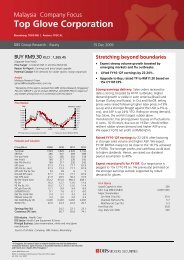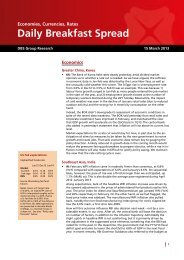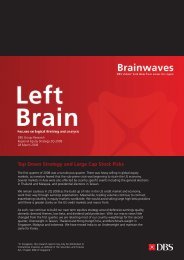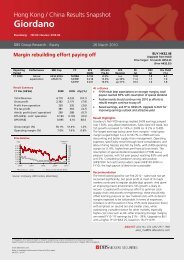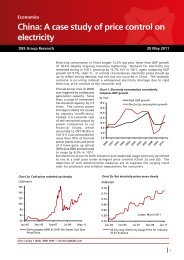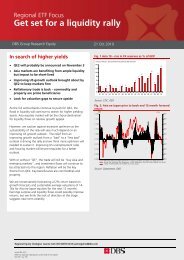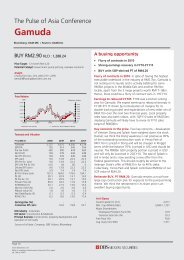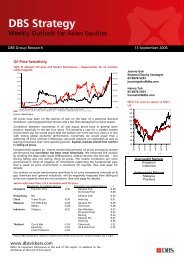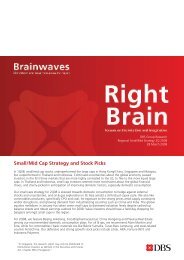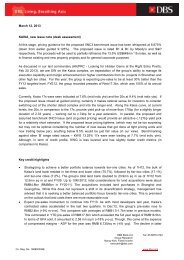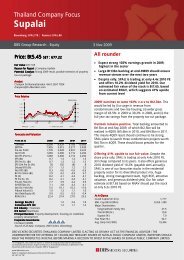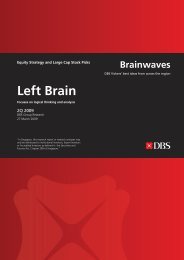Left Brain Right B - the DBS Vickers Securities Equities Research
Left Brain Right B - the DBS Vickers Securities Equities Research
Left Brain Right B - the DBS Vickers Securities Equities Research
You also want an ePaper? Increase the reach of your titles
YUMPU automatically turns print PDFs into web optimized ePapers that Google loves.
Regional Equity Strategy 4Q 2009<br />
Strategy Overview: Asia Equity<br />
Hong Kong: Inadequate price adjustment (Chris Leung, chrisleung@dbs.com, extracted from<br />
“Economics – Markets – Strategy, 4Q09” dated 17 September 2009)<br />
• While a low-interest rate environment may be<br />
instrumental in driving a quick economic turnaround<br />
for Hong Kong, <strong>the</strong> strong inflow of liquidity from<br />
mainland China as a partial result of its lax credit<br />
policy may play even a bigger role. Downward price<br />
adjustment in <strong>the</strong> current downturn have been <strong>the</strong><br />
mildest amongst o<strong>the</strong>r major crisis in <strong>the</strong> past decade<br />
• Unlike <strong>the</strong> 97/98 Asian Financial Crisis where asset<br />
prices endured a free fall, <strong>the</strong> quick turnaround in<br />
asset prices this time round has helped prevent <strong>the</strong><br />
labor market from deteriorating rapidly. Following<br />
<strong>the</strong> credit crisis, unemployment was widely expected<br />
to climb in similar fashion to <strong>the</strong> Asian Financial Crisis.<br />
However, this did not materialize. Stabilization of <strong>the</strong><br />
labor market has significantly reduced consumers'<br />
fears<br />
• The multi-year deleveraging process post-1997 and<br />
<strong>the</strong> concomitant buildup of wealth in <strong>the</strong> past<br />
decade have developed a strong cushion for Hong<br />
Kong against exogenous shocks. The rise in <strong>the</strong><br />
current account surplus as a share of GDP from 4.1%<br />
in 2000 to 14.2% in 2008 is one solid indication of<br />
this wealth accumulation. Fiscal reserves as a share of<br />
GDP also exceeded 30% in FY07/08 before <strong>the</strong><br />
onslaught of <strong>the</strong> credit crisis. Against this backdrop,<br />
<strong>the</strong> Hong Kong economy should be able to wea<strong>the</strong>r<br />
<strong>the</strong> storm, especially with support from <strong>the</strong> strong<br />
Chinese economy<br />
• In <strong>the</strong> near-term, both <strong>the</strong> Fed and <strong>the</strong> PBOC are<br />
likely to refrain from raising interest rates, not until<br />
<strong>the</strong>y see sustainable domestic-demand recovery.<br />
Assuming growth of 10% (QoQ, saar) and 5% in<br />
3Q09 and 4Q09 respectively, our real GDP growth<br />
projection for 2009 has been revised upward to -<br />
2.4% YoY, from -6.5% previously. Growth should<br />
come to 5.5% in 2010<br />
• Once China restores <strong>the</strong> appreciation bias on <strong>the</strong><br />
CNY (possibly in 2010) inflows are likely to present<br />
<strong>the</strong> usual problems for local inflation<br />
Challenges ahead<br />
Like <strong>the</strong> rest of <strong>the</strong> world, Hong Kong has been counting on<br />
both <strong>the</strong> US and China to lead <strong>the</strong> global economy out of <strong>the</strong><br />
woods. In <strong>the</strong> latest G7 meeting, policymakers pledged to keep<br />
monetary policy accommodative until <strong>the</strong>y see sustainable<br />
domestic-demand recovery. The PBOC will refrain from raising<br />
interest rates too soon.<br />
A low-interest rate environment alongside previous wealth<br />
accumulation will continue to help support property prices. If<br />
<strong>the</strong> real estate sector was able to sail through <strong>the</strong> recent crisis,<br />
<strong>the</strong>re is even less reason to expect a substantial downward<br />
correction now that <strong>the</strong> global economy is on a recovery path.<br />
If property prices do not adjust downward, o<strong>the</strong>r prices will<br />
remain sticky. Many are projecting that CPI inflation will return<br />
to <strong>the</strong> positive territory by <strong>the</strong> first quarter of next year. Once<br />
China restores <strong>the</strong> appreciation bias of <strong>the</strong> CNY, possibly in<br />
2010, inflows will present <strong>the</strong> usual inflation problems for<br />
Hong Kong.<br />
However, wage/salary growth will likely be absent for at least<br />
two years. In fact, we will probably see downward adjustments<br />
in future payroll data, as suggested by <strong>the</strong> popular adoption of<br />
"no pay leave" by many business enterprises. Corporates must<br />
see earnings improve visibly before <strong>the</strong>y will want to hire again.<br />
Salary growth will also only resume after corporate balance<br />
sheets improve. In <strong>the</strong> meantime, <strong>the</strong> financial burden will fall<br />
disproportionately on <strong>the</strong> middle class.<br />
Under our growth assumptions of 10% (QoQ, saar) and 5% in<br />
3Q09 and 4Q09 respectively, our full-year GDP projection for<br />
2009 now comes to -2.4% YoY , up from a previous forecast<br />
of -6.5% YoY. We expect <strong>the</strong> economy to grow a fur<strong>the</strong>r<br />
5.5% in 2010. However, <strong>the</strong>se figures do not reveal <strong>the</strong><br />
structural challenges ahead.<br />
Current Account balance<br />
% of GDP<br />
16<br />
14<br />
12<br />
10<br />
8<br />
6<br />
4<br />
2<br />
0<br />
Latest: 2008<br />
Dec-98 Dec-00 Dec-02 Dec-04 Dec-06 Dec-08<br />
Page 28<br />
“This report has been re-printed with permission from <strong>DBS</strong> Group <strong>Research</strong><br />
(Regional Equity Strategy) of <strong>DBS</strong> Bank Limited” disclosures on page 37 of this report



